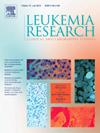Assessing the associations of blood metabolites with myelodysplastic syndrome: A bidirectional mendelian randomization study
IF 2.1
4区 医学
Q3 HEMATOLOGY
引用次数: 0
Abstract
Background
Metabolic disorders are a hallmark feature of cancer. However, evidence regarding the causality of circulating metabolites in promoting or preventing myelodysplastic syndrome (MDS) is currently insufficient. We conducted a bidirectional Mendelian randomization analysis (MR) to assess the causal relationship between genetically proxied 1400 blood metabolites and MDS.
Methods
In this study, we employed a bidirectional MR framework to explore the potential causal links between blood metabolites and the risk of MDS. Data on blood metabolites were derived from a comprehensive genome-wide association study (GWAS) dataset of European origin. Initial analyses used MDS GWAS data from the GWAS catalog. The pleiotropy, and heterogeneity analysis were applied to confirm the stability of the MR estimates.
Results
In a survey of 1400 metabolites, four exhibited statistical significance (P < 0.05) in an inverse variance weighted (IVW) model. Levels of Alpha-hydroxyisovalerate [odds ratio (OR) = 3.157, p < 0.001], Pregnenediol disulfate (C21H34O8S2) [OR = 2.805, p < 0.001] and 1-linoleoyl-GPG (18:2) [OR = 2.756, p < 0.001] were positively causally associated with MDS, while X-18345 [OR = 0.360, p < 0.001] was negatively associated with MDS. On the contrary, MDS did not lead to significant alterations in the levels of the aforementioned four blood metabolites.
Conclusion
In this study, a possible causal relationship was established between four blood metabolites and MDS. Among these, three specific blood metabolites were identified as causal factors in the development of MDS and were confirmed as risk factors. Interestingly, an unknown blood metabolite emerged as a protective factor.
评估血液代谢物与骨髓增生异常综合征的关系:一项双向孟德尔随机研究
背景:代谢紊乱是癌症的一个显著特征。然而,关于循环代谢物在促进或预防骨髓增生异常综合征(MDS)中的因果关系的证据目前尚不充分。我们进行了双向孟德尔随机分析(MR),以评估遗传代理的1400种血液代谢物与MDS之间的因果关系。方法在本研究中,我们采用双向MR框架来探索血液代谢物与MDS风险之间的潜在因果关系。血液代谢物的数据来源于欧洲的全基因组关联研究(GWAS)数据集。最初的分析使用了来自GWAS目录的MDS GWAS数据。应用多效性和异质性分析来确认MR估计的稳定性。结果对1400种代谢物进行调查,其中4种代谢物在逆方差加权(IVW)模型中具有统计学意义(P <; 0.05)。Alpha-hydroxyisovalerate水平(比值比(或)= 3.157,p & lt; 0.001],Pregnenediol硫酸氢盐(C21H34O8S2)(或= 2.805,p & lt; 0.001]和1-linoleoyl-GPG(十八2)(或= 2.756,p & lt; 0.001]积极与MDS有关,而x - 18345(或= 0.360,p & lt; 0.001]与MDS负相关。相反,MDS并没有导致上述四种血液代谢物水平的显著改变。结论在本研究中,四种血液代谢物与MDS之间可能存在因果关系。其中,三种特定的血液代谢物被确定为MDS发生的原因因素,并被确认为危险因素。有趣的是,一种未知的血液代谢物被认为是一种保护因素。
本文章由计算机程序翻译,如有差异,请以英文原文为准。
求助全文
约1分钟内获得全文
求助全文
来源期刊

Leukemia research
医学-血液学
CiteScore
4.00
自引率
3.70%
发文量
259
审稿时长
1 months
期刊介绍:
Leukemia Research an international journal which brings comprehensive and current information to all health care professionals involved in basic and applied clinical research in hematological malignancies. The editors encourage the submission of articles relevant to hematological malignancies. The Journal scope includes reporting studies of cellular and molecular biology, genetics, immunology, epidemiology, clinical evaluation, and therapy of these diseases.
 求助内容:
求助内容: 应助结果提醒方式:
应助结果提醒方式:


